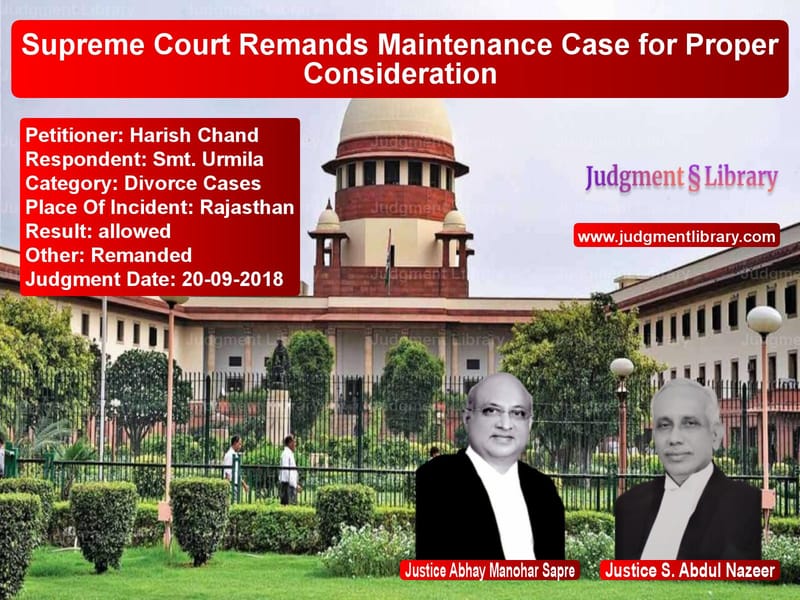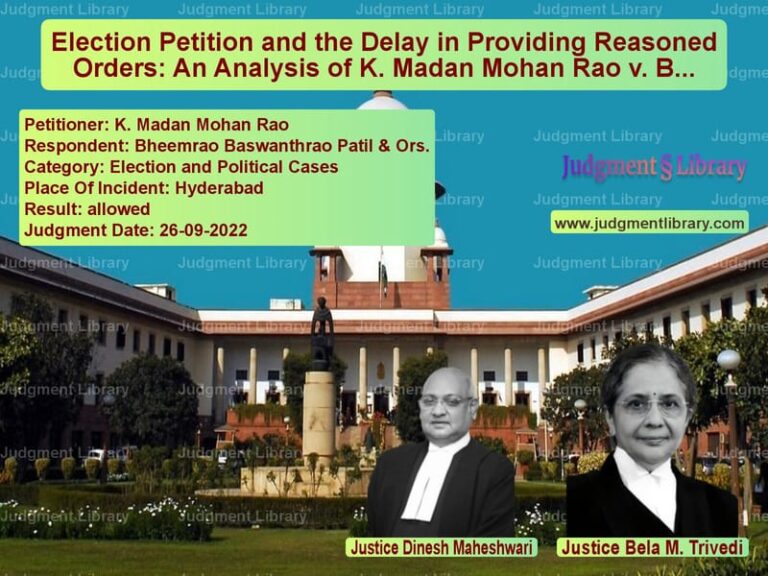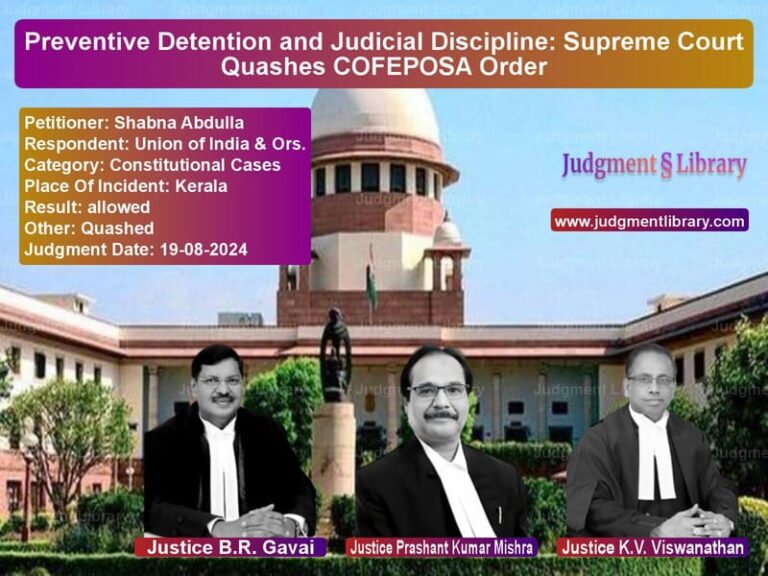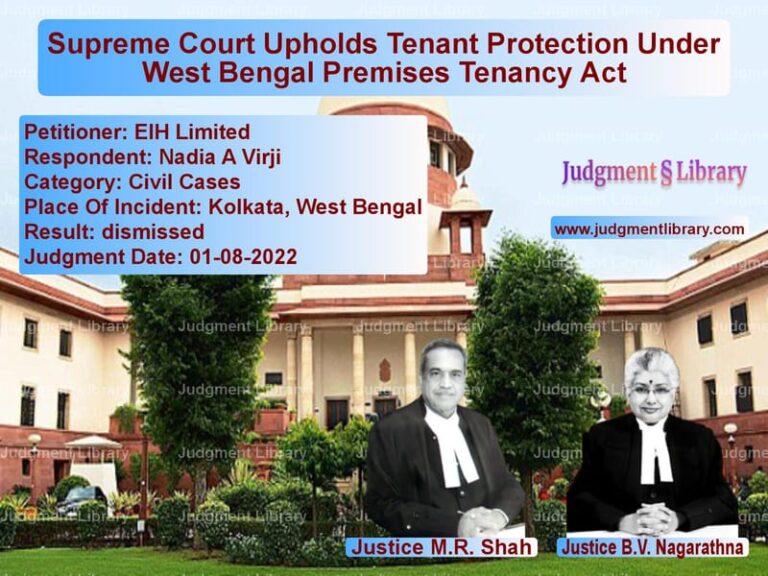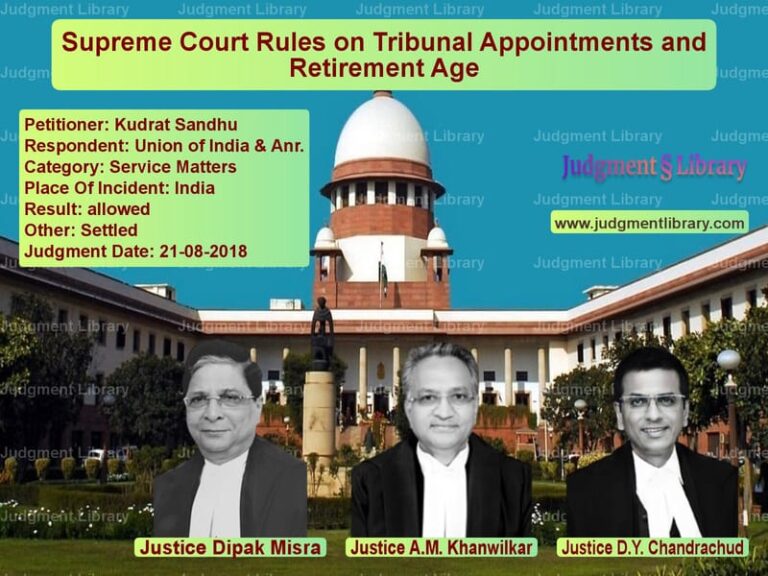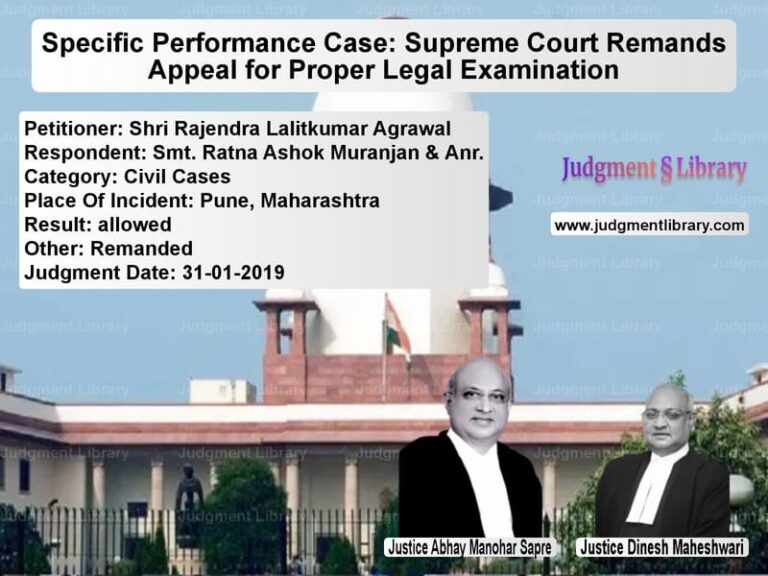Supreme Court Remands Maintenance Case for Proper Consideration
The Supreme Court, in its judgment dated September 20, 2018, in the case of Harish Chand vs. Smt. Urmila, addressed a critical issue related to maintenance claims under family law. The judgment primarily focused on the procedural lapses by the Rajasthan High Court, which had disposed of a revision petition in a highly cryptic manner, without considering the merits of the case.
Background of the Case
The dispute arose when the respondent, Smt. Urmila, filed an application under Section 125 of the Code of Criminal Procedure (CrPC) seeking maintenance from her husband, Harish Chand. The case was first heard by the Family Court in Bharatpur, which ruled in favor of the wife and directed the husband to pay maintenance.
Aggrieved by this order, Harish Chand filed a revision petition before the Rajasthan High Court, challenging the decision on multiple grounds, including his financial capacity and the respondent’s ability to sustain herself. However, the High Court dismissed the revision petition without adequately considering the facts, arguments, or applicable legal principles.
Arguments by the Petitioner (Harish Chand)
The petitioner, Harish Chand, argued that:
- The High Court failed to examine his financial status and obligations before awarding maintenance.
- The order was passed without recording proper reasons, making it legally unsustainable.
- The respondent (Smt. Urmila) had independent means to support herself and was not entitled to the maintenance amount granted by the Family Court.
- The High Court did not consider relevant legal provisions or precedents while dismissing his revision petition.
Arguments by the Respondent (Smt. Urmila)
The respondent, Smt. Urmila, countered these claims by asserting:
- The Family Court had correctly assessed her financial needs and the husband’s liability before awarding maintenance.
- The High Court’s decision should be upheld as Harish Chand was financially capable of providing maintenance.
- The order of the Family Court was based on legal and factual grounds, and the petitioner had no valid reason to challenge it.
Supreme Court’s Observations
The Supreme Court found that the Rajasthan High Court had disposed of the revision petition in a single paragraph, without setting out the facts, arguments, or reasons for its decision. The order simply stated:
“I have heard learned counsel for the respective parties and carefully scanned the entire material made available to me, including the impugned order passed by the learned court below, as also the fact that the petitioner is working as a headmaster/senior teacher in a government school and he is capable to maintain the respondent.”
The Supreme Court strongly disapproved of this approach, noting that:
“The Single Judge of the High Court neither set out the facts nor considered any submissions of the parties nor assigned any reasons and disposed of the revision petition in a cryptic manner.”
Supreme Court’s Key Findings
1. High Court’s Order Lacked Justification
The Supreme Court held that the High Court’s failure to discuss the facts, submissions, legal provisions, and reasoning made the order legally unsustainable.
“In the absence of any facts mentioned, submissions of both the parties noted, legal provisions referred, and the reasons assigned in the impugned order by the Single Judge, we are unable to know the factual background of the dispute involved in the case.”
2. Requirement of Proper Judicial Analysis
The Court emphasized that in a revision petition, the High Court is expected to analyze the reasoning of the lower court and address the legal and factual issues raised by the petitioner.
“We cannot countenance the disposal of the revision petition by the High Court in such a cryptic manner and, therefore, decline to concur with such an order.”
3. Need for Fair Consideration
The Court held that denying proper judicial consideration to a litigant amounts to a violation of natural justice and procedural fairness.
“The revision petition should have been decided by setting out facts, recording submissions of both parties, referring to relevant legal provisions, and assigning reasons before reaching a conclusion.”
Final Judgment
Based on these findings, the Supreme Court ruled:
- The appeal was allowed.
- The Rajasthan High Court’s order was set aside.
- The revision petition was remanded back to the High Court for fresh consideration.
- The High Court was directed to dispose of the case within six months, providing a detailed analysis and reasoning for its decision.
Implications of the Judgment
This ruling has significant implications for family law and judicial procedure:
1. Importance of Reasoned Orders
The Supreme Court reinforced that courts must provide reasoned orders, setting out facts, submissions, and legal principles before making a decision.
2. Protection of Natural Justice
The judgment upholds the principle that every litigant is entitled to a fair hearing and proper consideration of their claims.
3. Revision Powers Must Be Exercised Judiciously
The ruling clarifies that High Courts must not dismiss revision petitions summarily but instead evaluate them based on legal and factual merits.
4. Ensuring Transparency in Family Court Decisions
By remanding the case for reconsideration, the Supreme Court ensures that maintenance claims are handled transparently and fairly.
Conclusion
The Supreme Court’s decision in Harish Chand vs. Smt. Urmila sets an important precedent for judicial accountability and fair trial procedures. The ruling highlights that courts cannot issue orders without proper reasoning and must ensure that both parties’ arguments are thoroughly considered. The remand of the case to the High Court guarantees that maintenance disputes are decided with due legal consideration and not dismissed in a cursory manner.
Petitioner Name: Harish Chand.Respondent Name: Smt. Urmila.Judgment By: Justice Abhay Manohar Sapre, Justice S. Abdul Nazeer.Place Of Incident: Rajasthan.Judgment Date: 20-09-2018.
Don’t miss out on the full details! Download the complete judgment in PDF format below and gain valuable insights instantly!
Download Judgment: Harish Chand vs Smt. Urmila Supreme Court of India Judgment Dated 20-09-2018.pdf
Direct Downlaod Judgment: Direct downlaod this Judgment
See all petitions in Alimony and Maintenance
See all petitions in Child Custody
See all petitions in Domestic Violence
See all petitions in Judgment by Abhay Manohar Sapre
See all petitions in Judgment by S. Abdul Nazeer
See all petitions in allowed
See all petitions in Remanded
See all petitions in supreme court of India judgments September 2018
See all petitions in 2018 judgments
See all posts in Divorce Cases Category
See all allowed petitions in Divorce Cases Category
See all Dismissed petitions in Divorce Cases Category
See all partially allowed petitions in Divorce Cases Category

